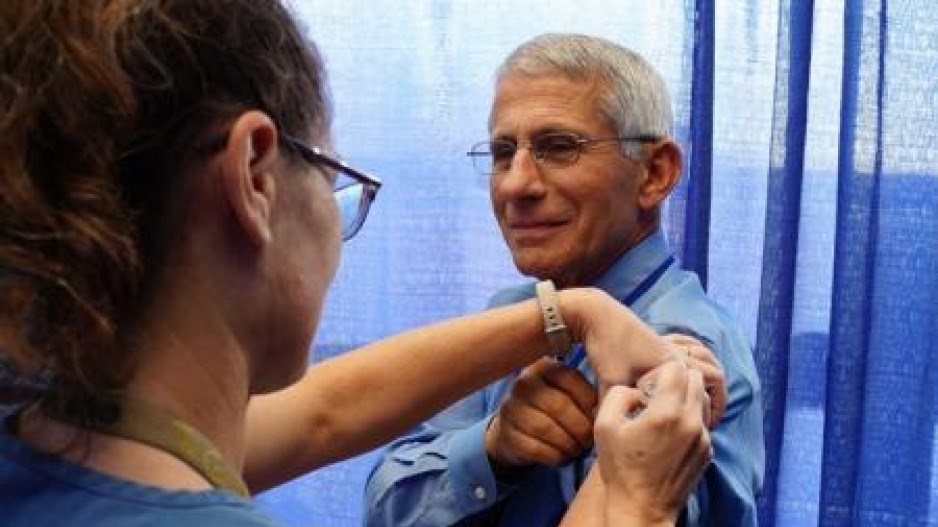While Dr. Anthony Fauci has yet to take a day off in the past 15 months, the face of the U.S. response to the pandemic did take time this week to reaffirm to British Columbians why COVID-19 vaccines remain safe and effective.
“Most people say, ‘You recognized the virus in January 2020 and we have vaccine going into people's arms 11 months later. How did that happen? It's impossible,’” the director of the U.S. National Institute of Allergy and Infectious Diseases (NIAID) said during a pre-recorded session featured Wednesday at Genome BC’s 2021 Genomics Forum.
“I point out to people that the work that we got to where we are right now with COVID-19 vaccines didn't start on January 20. It started decades ahead when we were able to sequence the viruses. Instead of taking months and months, it takes overnight. And instead of looking at one single aspect of the virus, you can you can sequence quasi-species of viruses at a rapid speed.”
Fauci said safety was paramount when developing and testing the vaccines that are now being administered on a scale never before.
However, skepticism over the vaccines remains prevalent among many people and was amplified this week when Canada’s National Advisory Committee on Immunization (NACI) recommended Canadians wait for the mRNA vaccines — the ones developed by Pfizer Inc. (NYSE:PFE) and Moderna Inc. (NYSE:MRNA) — if they are in a position to do.
The viral vector vaccines developed by AstraZeneca plc and Johnson & Johnson (NYSE:JNJ) have had a very small number of cases of blood clots linked to their jabs.
And in the case of the J&J vaccine, in which six out of seven million cases were detected, Fauci said it was perhaps a “too sensitive surveillance system” on the part of the U.S. Food and Drug Administration and Centers for Disease Control and Prevention that led to these concerns.
Canada’s first delivery of 300,000 J&J doses arrived in the country last week.
Earlier Wednesday, Health Canada approved the use of the Pfizer vaccine for children 12 and up — the first time a COVID-19 vaccine has been given the nod in the country for those age groups.
Fauci noted that children and pregnant women fall into a category of “vulnerable populations, which means that before you be doing anything on them, you really want to show that the product you're dealing with is both safe and effective in a normal adult population.”
Studies examined by Canadian regulators show the Pfizer vaccine was 100% effective at preventing COVID-19 in the young age group.
Meanwhile, Fauci said that genomic research is suggesting that we might require vaccine cocktails moving forward to best protect the global population as variants of concern arise in different regions.
“If we have to do a variant-specific boost every time we get a new worrisome variant, we're going to be chasing this like Whac-A-Mole,” he said.
“We really need to put a lot of effort — which we are — on first a pancoronavirus 2 vaccine, and then a true pancoronavirus vaccine for the entire family of coronaviruses.”
And while Fauci believes it “highly improbable” a vaccinated person can become infected with COVID-19, he is still urging people to continue wearing masks to help prevent the potential spread to non-vaccinated people.
“We didn’t do things in a unified, co-ordinated fashion. In some states, when they were supposed to be locking down, as it were, and obeying certain types of clinical guidelines for things like mask-wearing, avoiding congregate settings, did not do it very well,” he said, adding he is hoping a fourth wave does not unfold.
“I think as the history of this is written, people are going to go back to the development of vaccines for COVID-19 as the classic example of how fundamental basic research in multiple areas, including genomics, led us to do something that a decade ago would have seemed completely impossible.”
The Genomics Forum continues through to Thursday.




